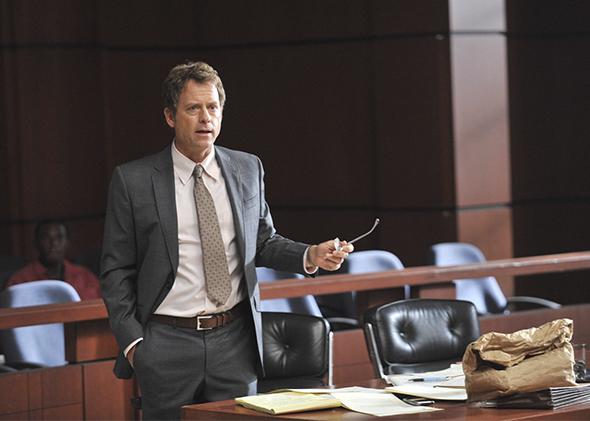Rake, Fox’s cheeky new legal drama premiering Thursday night, has a title problem. In an unexpected turn, its main character, a gambling addict and lady-killing lawyer, is not named Rake. The title of the show is not a pun, just a reference to its leading man’s alleged personality. Unfortunately, that leading man is played by Greg Kinnear.
Kinnear is a passable enough actor to have once been nominated for an Academy Award, but he radiates charm on the Ryan Seacrest scale, which only measures reliability, professionalism, and appeal to grandmothers. Kinnear does not project a strong sexual allure, and what he does project comes in the sexy accountant, sexy dad, sexy middle-manager range. He is not, in other words, in any way rakish. So there is no rake in Rake. Just a character named Keegan Joye.
Rake is based on an Australian series of the same name. One day, I fervently hope I will be able to write “… and the remake is vastly superior to the original,” but today is not that day. We first meet Keegan out at a bar, winking at women and getting beaten up in the bathroom by a loan shark. He has overstayed his welcome at the house of his married best friend Ben (John Ortiz) by months, is out of cash, has a dinky private practice, and seems completely unconcerned about any of this. He has a half-baked scheme that he can resolve his financial problems by landing a high-profile case, but is instead saddled with a slam-dunk case that, lucky for him, gets complicated. (Greta Van Susteren shows up in the pilot and Keegan says to her “that’s a typically great question from you,” if you are trying to measure his—and his network’s—smarminess.) Imagine if House, M.D. were a lawyer, but didn’t care at all about the law: That is Keegan. If Rake was a lawyer show about a mediocre, selfish lawyer trying to get rich by providing crappy services to his poor clients, that would be interesting—that is actually a show I haven’t seen before. But of course, Keegan is an effortlessly good lawyer whenever he slightly sets his mind to it.
When not gambling or trying to avoid his job, Keegan is charming women. There’s a prostitute he’s been seeing for a very long time who seems to find him utterly delightful; his best friend’s wife may be harboring a crush she masks as aggravation; his ex-wife hates him, yet flirts with him; and he has an assistant willing to help him even though he rarely pays her. Most galling of all, in the opening scene, Rake picks up a lanky Asian woman decades his junior, brings her to a party where he ignores her to gamble until the sun comes up, takes her home to his friend’s house, doesn’t remember her name, makes her leave in a hurry via a back door and hopped gate—and she is still desperate that he call her again. Middle-aged men’s fantasies deserve their moment on prime time like everyone else’s, but there should be some gesture toward plausibility made on behalf of the rest of us.
Interspersed with all of this lawyering and flirting, there is quirk and sass. Rake is a little bit like the bad Sundance movie version of a procedural, a sturdy genre project tricked out with twee and antic detailing, in the hopes you will find all the appended doohickeys sharp and adorable and not notice how predictably the story is chugging along. (Keegan cracks the case by looking at handwriting.) Someone who owes Keegan money pays him in tuna, so he spends an entire episode lugging a cooler of fish around to various sleazy sushi locales hoping they might buy some black-market ahi. He is forced to carpool a group of children to school and blatantly disregards their safety—reading while driving, and with an expired license—in a bit of child endangerment played for laughs. Those adorable kids! That adorable Keegan! He’s not nearly as cute as he thinks he is.
